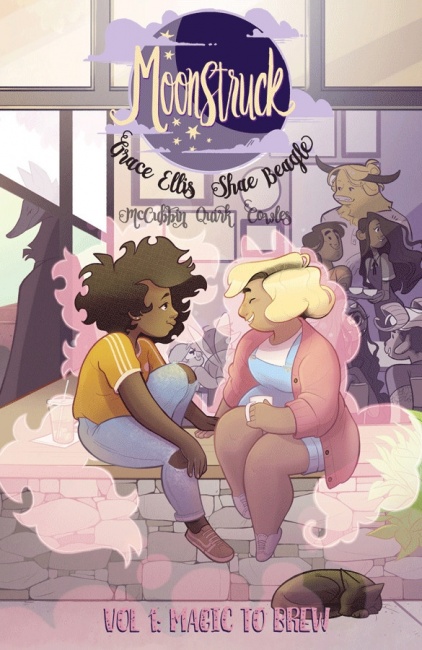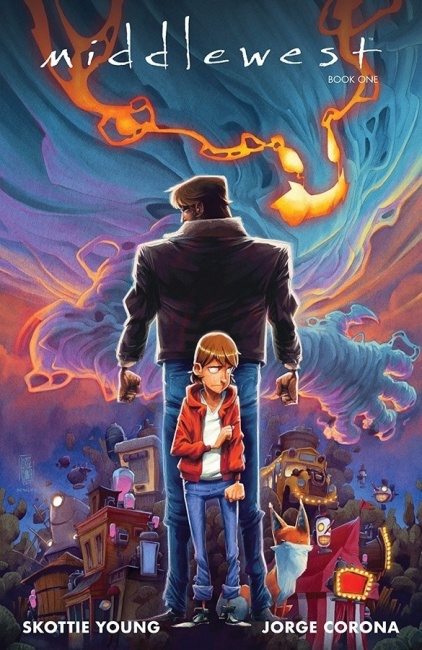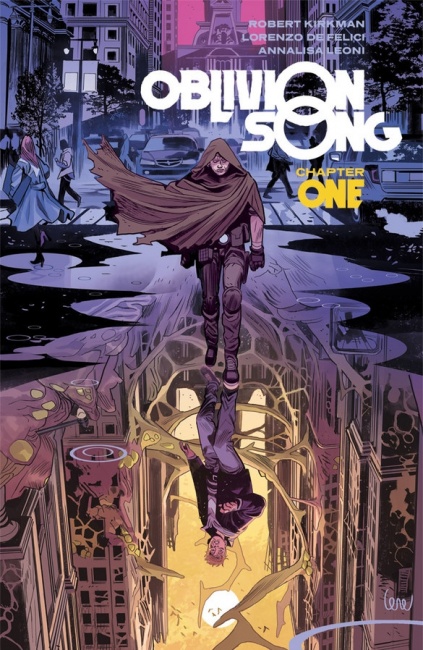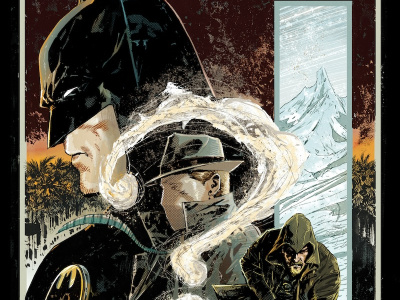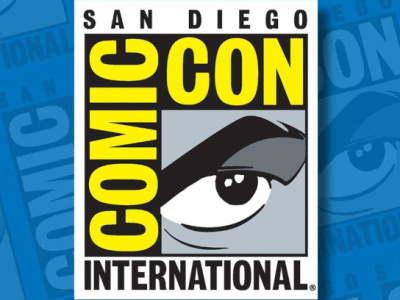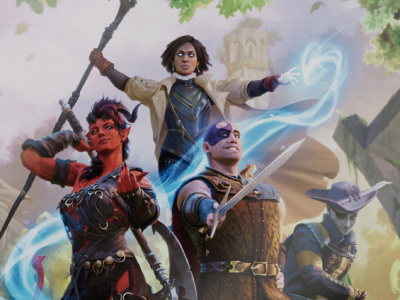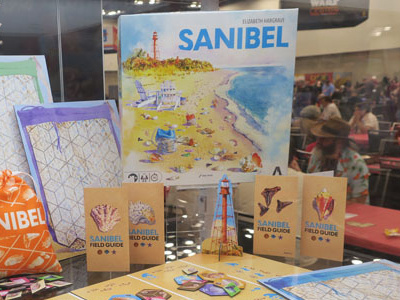We conducted this in-person interview with Image Comics Publisher Eric Stephenson at San Diego Comic-Conto to get his views on current issues. We discussed his perspective on the comics market "malaise," periodicals vs. graphic novels, whether tastes in genres are shifting, and Image titles that may offer more opportunities than are currently being realized.
What are we going through in the comics business right now, a creatively driven drought or are there macro factors affecting the market?
Eric Stephenson: First of all, there is a malaise. I think some of it is affected by people constantly talking about it. Because of social media, you have this constant discussion of how awful everything is. That wasn't happening 10 years ago before Twitter and Facebook had become the omnipresent entities that they are.
If you go back to look at the period between 2009 and 2011, right before the "New 52" started, that was the worst period. Sales were way worse. I think it was December 2010 (the December 2010 Previews, see "Top 300 Comics – February 2011"), you have the lowest number one, which is 71,000. We're not anywhere close to that now. There's a point back in 2010 when I think we had 12 books selling over 50,000. That's terrible. You go back and you mess around looking at different months in that period, and there's points where books selling over 20,000, I think it's 70‑something.
The economy was weak then, too.
Obviously, that was part of that. Things aren't nearly as bad as they were then, but it's being talked about a lot more. I think that makes it seem a lot worse than it is.
On top of that, on the creative side, I think there are a lot of good comics coming out. There are a lot of people doing strong work, but I don't think there's a lot that is exciting people. It says something when the end of a long‑running series is a source of big excitement in the marketplace.
That's the similarity if you go back to that period that I was referencing earlier, from 2009 to 2011. There was this low point, creatively, where there wasn't a lot going on. You knew that there was going to be a big event from Marvel. You knew that there was going to be a big event from DC; wash, rinse, repeat. The enthusiasm for that sort of thing wanes at a certain point. I think everybody realizes that it's just part of the marketing machine.
DC upended that a little bit in 2011 with the "New 52," which I think created some genuine excitement in the marketplace. A lot of people were surprised by how that worked. At the same time, The Walking Dead was becoming a big deal on TV. The single‑issue sales, the trade sales were on the rise. Then, over the course of 2012, we launched Saga, East of West, and a number of other big titles. Then, Marvel did Marvel NOW! You've got all of these things coming together to create excitement. That's just missing right now.
Not that people aren't trying.
It's not that people aren't trying. To a certain degree, this could be said of us, this could be said of anybody, but if you're just doing the same thing that you've always done, at a certain point, that becomes an accepted part of life. You're like, "This is what these guys do." Everybody expects it. If all you're doing is just meeting expectations, that's not very exciting. I think that's where the problem is.
The other thing we’re wondering about is the periodical format and whether the four‑issue arcs with continuing stories that are produced for collection turns people off. Do you think there's more resistance to that kind of storytelling now, or do you think it's maybe just being noticed now because of the lack of hits right now?
More resistance to which type of storytelling?
The serial storytelling, that you can't buy a single issue and get a complete story that's a satisfying experience.
I think the problem is there's a way to do that correctly, and there's the way that we do it. It seems like, in terms of periodical comics as an industry, we have forgotten how to make them. People complain about people waiting for the trade, and we're begging them to wait for the trade.
If you give somebody six pieces of a story priced at $4 or $5 apiece, and then you can get this trade over here for a comparable or cheaper price. Why would you buy this thing? Instead, get this complete story over here. To make matters worse, this probably isn't a complete story. This is just a bigger piece of a bigger story.
The reason why periodical comics worked was the same reason serials work on television. You want to get people to come back every time. The way you get them to come back is you give them enough of a satisfying story with a hook to come back for more. Now that doesn't seem to be how things are constructed. Everything is written for the trade. There's a lot of things where people think that if it doesn't do well as a single issue, it'll be collected as a trade, and then, magically, it's going to become a success. I don't know about you, but I haven't seen a whole lot of instances when that actually happens. It's like conventional wisdom is, "Things just sell better as trades." It's like, "No, not necessarily." You have to be successful in the first place.
You look at something like Immortal Hulk, which is a title that seems to be doing really well for Marvel. As near as I can tell, it seems like that's actually growing in sales at this point. With Immortal Hulk, even though he's telling a big story, each issue is a satisfying chunk of story that you can read and it gets better as it goes on. It’s just that not a lot of stuff is done that way. I think Robert did a good job of it with The Walking Dead. Saga is like that to a large degree. A lot of writers seem to think, "Everything will move at glacial pace." I don't know.
What can you, as a publisher, do about that, especially Image as a publisher, where the creators really drive the story?
It's a conversation I've been having with people and trying to direct people towards more fulfilling single issues. If you want to do a graphic novel, do a graphic novel.
Is Image doing more OGNs?
To some extent, yeah, we definitely got people interested in doing that. It's funny because there was one writer who had pitched a series to me. Then he came back and said, "What if I turned this into a graphic novel instead?" As we talked through it, it's like, "This doesn't sound like a graphic novel. It sounds like this was intended to be serialized."
Don't try to reverse engineer a series into a graphic novel just because you think that that's what the market wants. The first thing you should do is make sure that you're doing the book that you want to do and telling the story you want to tell. Through discussing it, we wound up agreeing that it was going to work best as a series. There are other instances where it's like, "This isn't a four-issue miniseries. This is a graphic novel."
One other big‑picture question, we just did an analysis for the magazine on content types. We broke down graphic novel content into four types of content: superhero, author, kids, and manga categories. Superhero and author were down, across channels, in 2018. A lot of the author side was probably The Walking Dead becoming less popular as the TV show became less popular. Just curious if you think there are any shifts in tastes away from genre content as opposed to material set in the real world?
That's a tough one. We don't do a tremendous amount of material that's set in the real world, so that would be difficult for me to answer.
Looking at something like Die, Die's not based in the real world at all, and that's been very popular for us. Monstress has been very popular for us. I'm confident that when Saga returns next that that'll continue to be popular.
It's just hit‑driven, basically?
I don't even think there's a problem with superheroes. This is anecdotal, but I go to the comic stores regularly, and I see younger people there, sometimes with their parents. They're looking for superhero comics to read because they've seen the movies. They do not want the IDW "these are superheroes for kids" comics. They want superhero comics. Unfortunately, they're impenetrable, and they're impenetrable from two angles. One, if you just pick one up and start reading it, you probably are not going to have an idea of what's going on. Two, if you go to an Avengers movie, which Avengers comic do you buy? There's so many Avengers. If you go to a Spider‑Man movie, which Spider‑Man comic do you buy? There's nine different Spider‑Man comics right now.
Sometimes, like in the case of the Spider-verse, they didn't have the Miles Morales origin story in print, except as an omnibus, when that came out.
Exactly, which is funny. I went and saw that movie. I don't go to see all the Marvel movies, but I went to see that one because I'd heard a lot of good things about it. From the trailers, it looked gorgeous. I came out of that movie more excited about superhero comics than probably since I was a kid. I was like, "What a fantastic movie!" I don't think they had something there for people who came out of that movie with that kind of excitement.
I visited a store over Fourth of July weekend. I was visiting friends up in the Seattle area, so we went to a lot of comic book stores. It was the weekend right after the last issue of The Walking Dead had come out. I got to talk to a number of people, and it was really interesting. There were a couple of stores that didn't rack new comics. One of them was a store called Amazing Heroes.
Amazing Heroes said that they mainly do back issues. I asked why. They said there's a lot of stuff going on in the Marvel and DC books that everybody knows that will eventually be rebooted or revamped. People can go back and read those [back issue] stories, and those stories matter. None of the stories matter now. If you're telling people, and by telling them, I mean through business practices, through constantly relaunching, renumbering, rebooting, if that's the message you're sending people, "We'll just change this and we'll keep changing it," there's no incentive for people to stick with something. If you're investigating it for the first time, it's confusing where to get in. Sometimes I think that we do a phenomenal job of making things hard on ourselves.
Could you share some thoughts on titles that people might be missing -- some kids' titles specifically, or any others that you think a direct‑market retailer should be paying more attention to, that have more opportunity than they're recognizing?
In terms of kids' comics specifically, we've done a handful of books that are performing better in bookstores than they are in comic‑book stores. Moonstruck is one of those, by Grace Ellis and Shae Beagle. Cat and Kit Seaton did a book for us that was nominated for an Eisner called Norroway, which has done really well. There's another kid‑friendly book that we do called Oddly Normal, that, again, does better in bookstores than it does in comic‑book stores. Those are things that I think any comic‑book store that's looking to grow that audience or that section of their store could benefit from checking out.
In terms of other books that we publish, a couple of other Eisner‑nominated books that are huge critical successes, Isola, and Middlewest. Middlewest is Skottie Young's [and Jorge Corona’s] book. Isola is by Brenden Fletcher and Karl Kerschl. Everybody loves those books, and they do moderately well for us, but given how good they are, they should be doing much better.
It's funny watching all the people talk about, "What are we gonna do without The Walking Dead?" One of our other best‑selling books is this book Oblivion Song that Robert Kirkman does. It's a fantastic book. It's funny because it out‑sells a lot of other books we do, but nobody ever talks about it. It's weird. Do people not talk about it because it's Robert's other book? Do they just not get it?
It's such a great universe.
If I was going to recommend another book to somebody who was bemoaning the loss of The Walking Dead, I would tell them to check out Oblivion Song.

The Comics Market 'Malaise;' Periodicals vs. Graphic Novels; Genre Tastes; and Image Titles with Overlooked Potential
Posted by Milton Griepp on August 16, 2019 @ 9:40 am CT
MORE COMICS
Hard-Boiled Thriller About a Sinister Utopia
August 5, 2025
The three title characters investigate the dark underside of a utopian project in this hard-boiled thriller.
Column by Rob Salkowitz
August 5, 2025
In this week's column by Rob Salkowitz, he looks at the industry's biggest show, held in the midst of some existential issues.
MORE NEWS
'Heroes of Faerun' and 'Adventures in Faerun'
August 5, 2025
Wizards of the Coast unveiled two Dungeons & Dragons: Forgotten Realms books.
New Board Game by Elizabeth Hargrave
August 5, 2025
Avalon Hill showcased Sanibel at their booth, a new board game by Elizabeth Hargrave.




